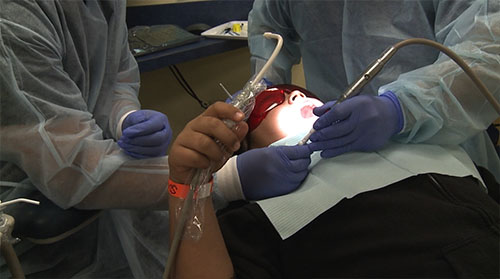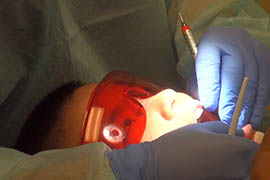Cronkite News has moved to a new home at cronkitenews.azpbs.org. Use this site to search archives from 2011 to May 2015. You can search the new site for current stories.
Officials, experts out to improve state’s poor ratings for kids’ oral health
GLENDALE – Watching a Midwestern University dental team give her 8-year-old son a free screening, cleaning and tooth sealant at “Super Sealant Saturday,” Sonia Ortega said she was happy to see him getting quality care.
“I want him to understand that getting to the dentist is important for his overall health now and in the long run will save him money when he is an adult,” she said.
Michael Johnson said he brought his 7-year-old daughter not just because he knows that good oral health leads to better overall physical health but because good teeth are part of a good smile.
“I want my daughter to have that advantage,” he said.
Dental experts say such events are one way to improve oral health among Arizona’s children and address a problem they say transcends socioeconomic status and access to care.
According to recent studies by The Pew Charitable Trusts, Arizona ranked third from the bottom nationally due to a high rate of tooth decay among third-graders and rated a grade of D for the percentage of high-needs schools that didn’t have sealant programs.
Dr. Sheri Brownstein, an assistant professor with Midwestern’s College of Dental Medicine-Arizona, said too many parents think childhood dental care isn’t necessary because the baby teeth will fall out anyway.
“It’s important for parents to know a decayed primary tooth located right next to a developing permanent tooth causes damage to that permanent tooth also,” she said.
Dr. Joseph Creech Jr., president of the American Board of Pediatric Dentistry and an associate professor at A.T. Still University’s Arizona School of Dentistry & Oral Health in Mesa, said some parents believe that dental problems are normal.
“They say, ‘Our family has soft teeth – Grandma had ‘em, Grandpa had ‘em, Mom and Dad had ‘em’ – and now the child has them,” Creech said. “And so we need to make sure parents understand that tooth decay is not normal and can be prevented.”
Julia Wacloff, chief oral health officer with Arizona Department of Health Services, said the state is working to improve oral health in preschools by offering discounted license fees for schools that have health education curriculums that include an oral health focus.
“Using a soft toothbrush and getting that toothbrush in the mouth with fluoridated toothpaste is really what’s it’s about to prevent tooth decay,” she said.
Wacloff said that early prevention heads off painful decay that can cause behavior and learning problems.
Dr. Matt Barcellona, a Scottsdale pediatrician, said that though most insurance policies don’t cover fluoride varnish his group offers varnishes beginning at age 1 since it is effective in preventing decay.
“When those first teeth erupt, we remind parents it’s important to start making regular visits to the dentist,” he said.
Kevin Earle, executive director of Arizona Dental Association, said getting insurance providers to cover fluoride varnishes when applied by medical providers, including pediatricians, would help drive down the state’s tooth decay rates.
“When kids are seeing their pediatricians for well checks, it’s a perfect time to do some easy preventive dental care, and we shouldn’t be passing up that opportunity,” Earle said.
Administrators with the Arizona Health Care Cost Containment System, the state’s Medicaid insurer, are preparing to cover fluoride varnish as part of the medical care available to children.
“We don’t have the exact date yet, but sometime next year we’ll implement that coverage,” said Jennifer A. Carusetta, chief legislative liaison for AHCCCS.









